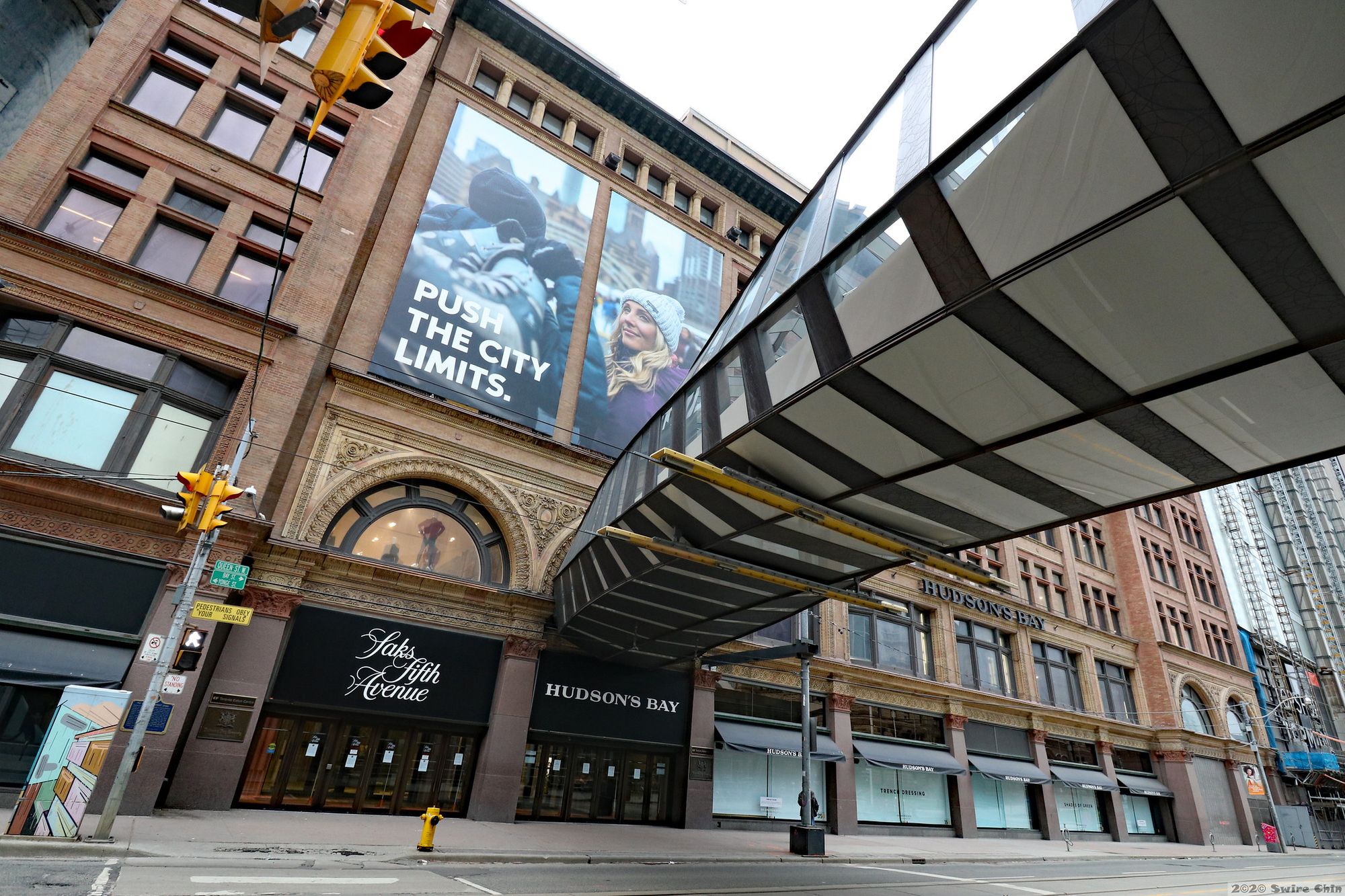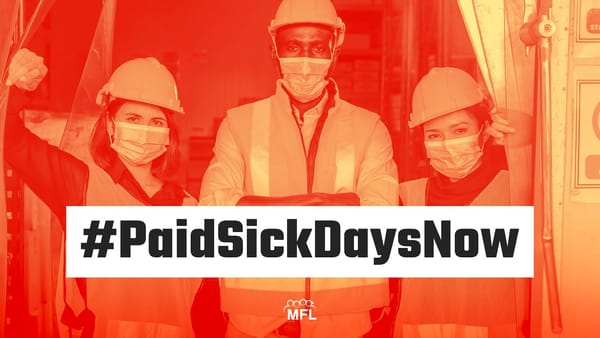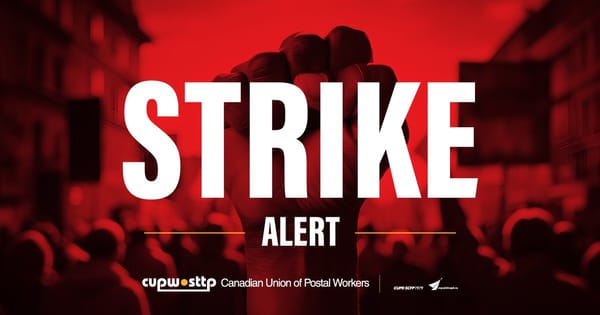This past week saw a further episode in Canada’s warehouse labour battles, as union members at The Bay’s e-commerce fulfillment centre in Toronto hit the picket lines. After a nine day strike, yesterday workers represented by Unifor ratified a new contract containing a 13.3 per cent pay increase, retroactive pay for work during the pandemic and new language guaranteeing a right to participate in discussions on new technology.
Warehousing and logistics are emerging as key sites in contemporary struggles over work. Although Amazon attracts more than its share of media attention — owing in large part to that company’s extreme anti-union actions — the warehousing sector in general is a hotbed of class struggle. Warehousing is also a strategic point of leverage for the 21st century labour movement.
As North America has deindustrialized and supply chains have grown longer and more complex, shipping and warehousing have solidified as integral sites of capitalist accumulation. The realization of profit in the contemporary economy is now highly dependent on workers who store and move goods. This industrial reorganization has not only transformed the labour market, creating many new jobs in warehousing and logistics, but also amplified the strategic power of workers in these sectors.
In the current context of elevated inflation and pent up militancy following the pandemic, we are beginning to see some promising signs of workers exercising their collective power. Union members at grocery warehouses in Ontario and Quebec, for example, have recently won impressive gains. In April, a strike at the Metro Distribution Centre in Etobicoke, Ont., ended with a wage increase of 15.8 per cent over four and a half years. Back in January, workers at a Sobeys distribution centre in Whitby, Ont., managed to win 19.5 per cent over four years for full-time employees as well as sizable wage gains for part-time staff.
These victories are in part an outgrowth of Unifor’s “Warehouse Workers Unite” campaign, a strategic effort to build union power in the this sector. At yet another Sobeys warehouse in Terrebonne, Que., United Food and Commercial Workers union members struck in February and secured wage increases of up to 28 per cent upon contract ratification, and up to 12 per cent over the next three years.
The fight may now be moving outside of grocery warehouses. On June 22, more than 330 warehouse workers at HBC Logistics — the e-commerce division of The Bay — went on strike when the company refused to offer retroactive pay increases for work performed during the COVID-19 pandemic and lockdowns. These workers are members of Unifor Local 40 and process online orders for The Bay at HBC Logistics’ warehouse in Toronto.
Workers had been without a new collective agreement since May 2021. Responding to a surge in online shopping, workers and their union had postponed contract negotiations with the company and instead worked through the pandemic under the terms of their expired collective agreement. When bargaining finally commenced this year, all praise for “essential workers” went out the window and the company instead tabled wage increases on a “go-forward” basis only.
HBC effectively told workers that the pay they sacrificed and the health risks they endured throughout 2020 and 2021 were all in the name of boosting company profits. One worker quoted in the Globe and Mail reported earning less than $20 per hour and not receiving a raise since 2019. Pressure to work overtime is also common at HBC. Additionally, Unifor estimates that around two dozen members contracted COVID-19 at work, with one worker dying as a result.
During the labour dispute, company representatives told the Toronto Star that they expected “absolutely no disruption […] to customer orders.” HBC attempted to maintain business as usual through the brazen use of scabs to undermine striking workers. Unifor Local 40 members, the majority of whom are racialized, managed to delay buses bringing scabs to the warehouse, but the degree to which this slowed operations at HBC Logistics is unknown. Once again, HBC’s actions during the strike are further evidence of why workers need anti-scab law protections in all Canadian jurisdictions, not just British Columbia and Quebec, as is currently the case.
At the same time that it refused to pay workers the wage increases they would have received if bargaining had begun as planned in 2021, HBC made out handsomely. Through the mid-2010s, the parent company swallowed up other businesses in Canada and abroad as well as lucrative real estate assets. In 2019, a consortium of shareholders devised and executed a plan to take the company private, eventually delisting it from the Toronto Stock Exchange a year later. Following this, HBC downsized some of its operations, selling stores in Europe and the United States, and began growing its online presence.
HBC remains the owner of Hudson’s Bay, Saks Fifth Avenue and Saks Off 5th, while its Bay retail division has grown considerably. Since last year, The Bay (of which HBC Logistics is a division) has operated as a separate business entity from Hudson’s Bay. In part a response to the boom in e-commerce during the pandemic, the financial reorganization of the company was also meant to rationalize its online business and impose cost-cutting ‘efficiencies’ throughout its supply chain. As well, the growth strategy of The Bay’s e-commerce business includes its recently launched online Marketplace, through which other brands and sellers may host and sell their products. This is HBC’s “platform strategy” to essentially extract rent from other businesses by transforming its website into a large e-commerce hub. As of 2021, The Bay’s Marketplace was, according to Retail Insider, the sixth largest e-commerce business in Canada.
Reorganizing HBC for profit maximization has also been coupled with outrageous executive compensation. Now that HBC is private, the company is no longer required to disclose its executive pay and bonuses. However, in 2019, then CEO Helena Foulkes received a $29.4 million compensation package, making her one of the highest paid CEOs in Canada. Foulkes was replaced as HBC CEO by Richard Baker in 2020, who had previously been HBC’s governor and executive board chairman. Baker, an American real estate mogul, bought Hudson’s Bay and its Zeller’s subsidiary in 2008 when both firms were in trouble, hoping to cash in on the underlying real estate. Baker’s National Realty & Development Corp. (NRDC Equity Partners) shuttered Zeller’s and revamped HBC. It was then Baker and NRDC who led the shareholder push to take HBC private in 2020.
Of course, like many other profitable and cash-flush corporations during the pandemic, HBC also bellied up to the trough for government handouts. As Dwayne Gunness, vice-president of Unifor Local 40, put it during the strike: “This is a company that received assistance from taxpayers by accessing the Canada Emergency Wage Subsidy (CEWS) during COVID but is now choosing to take advantage of the people who actually worked through the pandemic.”
On June 28, the union announced that they’d reached a tentative agreement with HBC. Yesterday, as mentioned, 80 per cent of members voted in favour of the deal and ratified the new contract. Workers ultimately won $1,500 in retroactive pay and 13.3 per cent in wage increases over the life of the new collective agreement, putting their raises in line with those recently won by other warehouse workers in Ontario and Quebec.
HBC workers led a successful and inspiring strike and won what they deserved. Any less from this profitable corporation would have been a slap in the face.








Member discussion